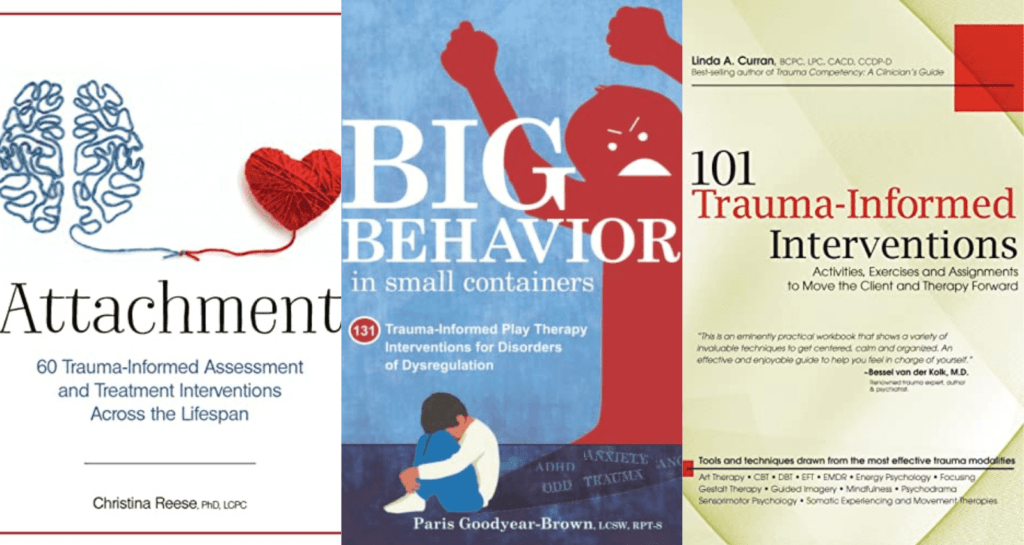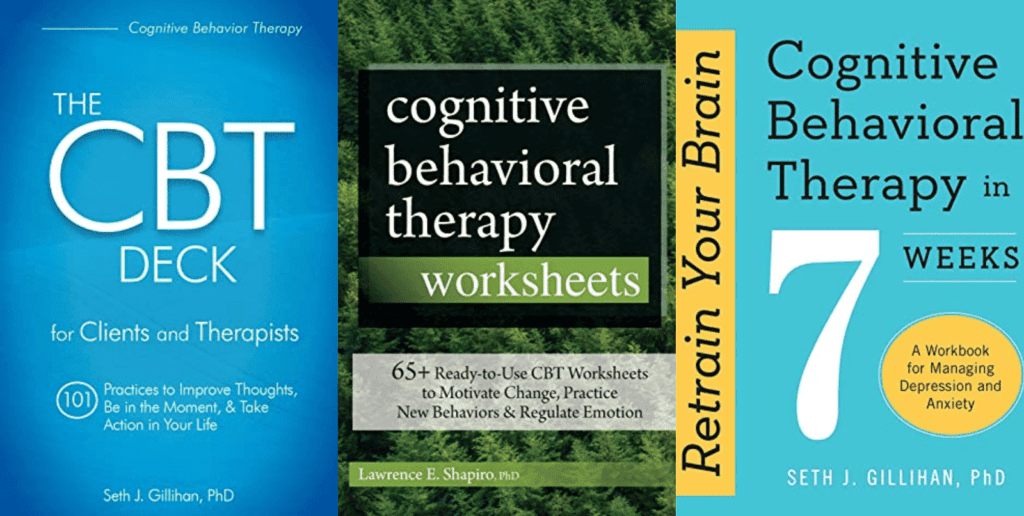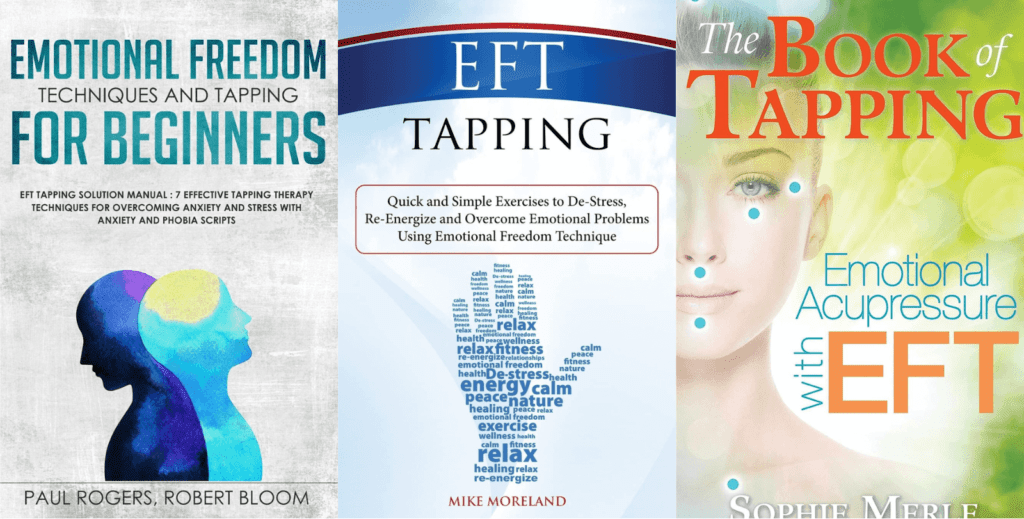The following are some of the best trauma informed care books.
- What Is Trauma Informed Care?
- Trauma Informed Care Books
- 1. 101 Trauma-Informed Interventions
- 2. Big Behaviors in Small Containers
- 3. Attachment
- 4. Building a Trauma-Informed, Compassionate Classroom
- 5. Trauma-Sensitive Mindfulness
- 6. The Body Keeps the Score
- 7. Becoming trauma informed
- 8. Treating the Trauma Survivor
- 9. A Little Book About Trauma-Informed Workplaces
- 10. Trauma-Sensitive Instruction
- How Trauma Informed Care Books Can Help
- Conclusion
Disclosure: Some of the links below are affiliate links. This means that, at zero cost to you, I will earn an affiliate commission if you click through the link and finalize a purchase.
What Is Trauma Informed Care?
Trauma-informed care is an approach to providing support and services that take into account the impact of trauma on an individual’s life.
It recognizes that many individuals have experienced trauma at some point in their lives, and that this trauma can have long-lasting effects on their physical, mental, and emotional well-being.
Trauma-informed care involves creating a safe and supportive environment where individuals feel respected and empowered.
It emphasizes the importance of building trust and establishing a collaborative relationship between the provider and the individual. This approach acknowledges the individual’s unique experiences and helps them feel heard and validated.
Through trauma-informed care, providers strive to understand the impact of trauma on an individual’s thoughts, feelings, and behaviors.
They use this understanding to adapt their practices and interventions accordingly, and to avoid retraumatization or further harm.
Trauma Informed Care Books
1. 101 Trauma-Informed Interventions
By Linda Curran

This is the workbook that all mental health professionals wish they had at the beginning of their careers. Containing over 100 approaches to effectively deal with trauma, this workbook pulls together a wide array of treatments into one concise resource. Equally useful in both group and individual settings, these interventions will provide hope for the client, as well as expand and solidify the professional’s expertise.
Related: Why Is Trauma Therapy So Hard? (+Best Trauma Healing Exercises To Support Your Recovery)
2. Big Behaviors in Small Containers
By Paris Goodyear-Brown

In Big Behaviors in Small Containers, you’ll find 131 practical, fun, and ready-to-use play therapy interventions that shift the paradigm around problematic behaviors to allow for therapeutic growth and healing. Based on TraumaPlay®, a treatment approach that prioritizes attachment, co-regulation, and the science of the stress response system, the interventions inside will help kids:
- Develop a sense of safety and security
- Expand their window of tolerance
- Cope adaptively with anger, anxiety, and other strong emotions
- Enhance their emotional literacy
- Strengthen social skills and self-esteem
- Challenge and overcome unhelpful thoughts
- Develop a coherent narrative around trauma and other difficult experiences
- And more!
Related: 7 Trauma Release Exercises To Support Your Recovery After Trauma
3. Attachment
By Christina Reese

Improve your client’s relationships by teaching them strategies to feel more connected reestablish trust, and restore positive emotions. Dr. Christina Reese, a recognized attachment and trauma professional, has created a comprehensive guide that explains attachment over a lifetime, and offers trauma-informed approaches to treat attachment at any age.
– Clinical examples, handouts and worksheets to use with clients of all ages
– Recognize attachment styles
– Identify key symptoms of attachment difficulties and their inception
– Interventions that repair attachment traumas to heal stress, shame, and anxiety
– Techniques to help clients improve their relationships (children, parents, friends, and significant others)
Related: Do I Have Trauma? Top 4 Practical Exercises To Support Your Trauma Healing
4. Building a Trauma-Informed, Compassionate Classroom
By Jennifer Bashant

Mental health expert Jennifer Bashant details how using a trauma-informed approach will greatly reduce, even eliminate, challenging behavior in your classroom. Using her practical, easy-to-use strategies based on the latest research, every educator can create a classroom where all students feel welcomed, supported, and ready to learn.
- Understand the impact of trauma on learning and behavior
- Tools to connect with all students, and foster intrinsic motivation
- Learn how to move away from points and stickers
- Strategies to build resilience and instill hope in your students
- 27 downloadable worksheets and exercises
Related: Inner Child Wounds Test (+4 Attachment Imagery Exercises To Heal Inner Child Wounds)
5. Trauma-Sensitive Mindfulness
By David A. Treleaven

Trauma-Sensitive Mindfulness explains how we can minimize the potential dangers of mindfulness for trauma survivors while leveraging its powerful benefits.
The book illustrates the ways mindfulness can help—or hinder—trauma recovery and offers a groundbreaking and practical approach that empowers those looking to practice mindfulness in a safe, transformative way.

6. The Body Keeps the Score
By Bessel van der Kolk M.D.

“The Body Keeps the Score” by Bessel van der Kolk is a groundbreaking book that explores the intricate connection between the brain, mind, and body in the healing of trauma. In this paperback edition, Dr. van der Kolk, an experienced psychiatrist and researcher, provides profound insights into the effects of trauma on individuals and offers an empathetic understanding of their experiences.
With gentle expertise, Dr. van der Kolk guides readers through the complex world of trauma and its far-reaching effects on various aspects of our lives. Drawing from years of research and clinical practice, he delves into the mechanisms by which trauma alters the brain’s structure and function. Through compelling narratives and case studies, he illustrates the profound impact of trauma on emotions, memory, and self-perception.
This book not only focuses on the negative consequences of trauma but also highlights the potential for healing. Dr. van der Kolk explores various therapeutic approaches and techniques that can effectively address trauma and its associated symptoms. From somatic experiencing to neurofeedback and yoga, he presents a wide range of evidence-based treatments that empower individuals to regain control over their bodies and minds.
Related: Top 10 Signs You Might Be Counterdependent
7. Becoming trauma informed
By Nancy Poole, Lorraine Greaves

“Becoming Trauma Informed” is a compassionate and insightful guidebook, edited by Nancy Poole and Lorraine Greaves. This enlightening paperback explores the concept of trauma-informed care, providing valuable knowledge and resources for professionals, caregivers, and individuals seeking a deeper understanding of trauma and its impact.
The book delves into the various facets of trauma, shedding light on its complex nature and the profound effects it can have on individuals’ lives. It examines trauma through a lens of empathy and compassion, highlighting the importance of creating safe and supportive environments for those who have experienced trauma.
Through a collection of expertly written chapters by leading practitioners and researchers, “Becoming Trauma Informed” offers practical strategies and evidence-based practices that can be applied in diverse settings. These include healthcare, education, social services, and criminal justice systems, among others.
Related: Undermothered: How to Mother Yourself Using These Practical 10 Strategies?
8. Treating the Trauma Survivor
By Carrie Clark, Catherine C. Classen, Anne Fourt, Maithili Shetty

Treating the Trauma Survivor: An Essential Guide to Trauma-Informed Care is a comprehensive and invaluable resource for professionals working with trauma survivors. Written by experts in the field – Carrie Clark, Catherine C. Classen, Anne Fourt, and Maithili Shetty – this book offers a detailed understanding of trauma and provides practical guidance on how to provide effective care.
The authors begin by exploring the impact of trauma on individuals, discussing the various types of trauma and its potential long-term effects on physical, emotional, and psychological well-being. They emphasize the importance of adopting a trauma-informed approach, which takes into account the unique needs and experiences of trauma survivors.
Using a compassionate and evidence-based approach, the authors guide readers through the process of assessment, diagnosis, and treatment planning. They explore various therapeutic modalities, such as cognitive-behavioral therapy, eye movement desensitization and reprocessing (EMDR), and mindfulness-based interventions, providing step-by-step instructions and practical examples.
Related: How To Heal From The Father Wound In 7 Steps (+FREE Worksheets)
9. A Little Book About Trauma-Informed Workplaces
By Nathan Gerbrandt, Randy Grieser, Vicki Enns

A Little Book About Trauma-Informed Workplaces is a compassionate and essential guide that explores the concept of trauma-informed practices within the workplace. Written by authors Nathan Gerbrandt, Randy Grieser, and Vicki Enns, this paperback serves as a valuable resource for creating supportive environments that promote healing, well-being, and growth.
With gentle and patient guidance, the authors delve into the topic of trauma and its impact on individuals in a professional setting. They provide practical insights and strategies for organizations to adopt a trauma-informed approach, emphasizing empathy, understanding, and resilience.
Throughout the book, the authors emphasize the importance of creating safe spaces where employees feel heard, validated, and supported. They highlight the power of building relationships based on trust and collaboration, which fosters a sense of belonging and healing for both individuals and teams.
Related: Best 15 Inner Child Exercises: How To Connect With Your Inner Child (& Heal Your Childhood Wounds)
10. Trauma-Sensitive Instruction
By John F. Eller, Tom Hierck

Trauma-Sensitive Instruction: Creating a Safe and Predictable Classroom Environment is a comprehensive guide written by John F. Eller and Tom Hierck, two experienced educators who specialize in supporting trauma-impacted students. In this book, they provide valuable strategies for creating a positive and nurturing classroom environment that promotes healing, growth, and academic success.
With a compassionate and understanding approach, the authors emphasize the importance of recognizing and addressing the unique needs of students who have experienced trauma. They offer practical tips and techniques that teachers can implement to foster a safe and predictable classroom environment where students feel secure and supported.
Throughout the book, Eller and Hierck provide insights into the impact of trauma on learning and behavior, helping educators gain a deeper understanding of the challenges faced by trauma-impacted students. They share research-based practices and interventions, as well as real-life examples and case studies, to illustrate their concepts and demonstrate their efficacy.
Related: Inner Child Wounds Test (+4 Attachment Imagery Exercises To Heal Inner Child Wounds)

How Trauma Informed Care Books Can Help
Trauma-informed care books can be incredibly helpful in many ways. Here are a few reasons why:
1. Understanding trauma: These books provide valuable insights into what trauma is, its impact on individuals, and how it can manifest in various ways. They help readers develop a deeper understanding of the complexities surrounding trauma.
2. Identifying triggers: Trauma-informed care books often discuss common triggers and how they can affect someone who has experienced trauma. This knowledge allows individuals to recognize and respond appropriately when encountering such triggers, whether in themselves or others.
3. Empathy and compassion: These books emphasize the importance of approaching trauma survivors with empathy, compassion, and sensitivity. They provide practical guidance on how to create safe and supportive environments that promote healing and growth.
4. Self-care: Trauma-informed care books also highlight the significance of self-care for both trauma survivors and those providing support. They offer strategies and techniques for practicing self-care to prevent burnout and maintain our own well-being while helping others.
5. Building resilience: By exploring the principles of trauma-informed care, these books teach how to foster resilience in individuals who have experienced trauma. They shed light on the fundamental aspects of resilience-building, which include offering opportunities for empowerment, connection, and healing.
6. Professional development: For professionals working in fields such as therapy, counseling, social work, or teaching, trauma-informed care books serve as a valuable resource. They can enhance their knowledge and skills, staying updated with current research and best practices in trauma care.
Related: Top 10 Signs Of Toxic Shame In A Person (+Best 20 Healing Shame Exercises)
Conclusion
Trauma-informed care books contribute to creating a more compassionate and informed society by equipping individuals with the knowledge and tools they need to provide effective support and care to those impacted by trauma.



